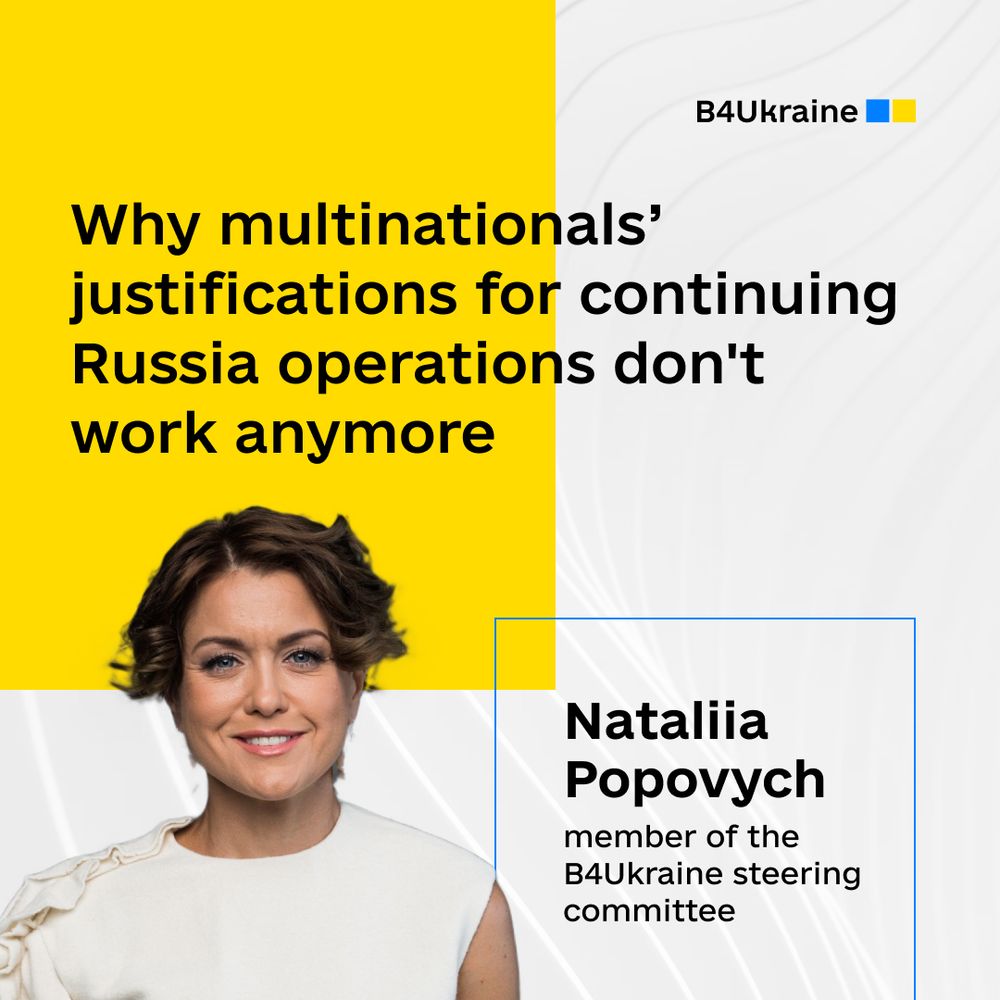
The simple truth is that after 600 days of the great war, more than half of international companies are continuing operations in Russia, contributing to its war machine. Those who sided with Ukraine by leaving the Russian market are fewer.
The pace of corporate exits has now slowed significantly. During B4Ukraine’s attempts to establish a dialogue with 140 global companies and instil a sense of urgency in their decision-makers, we have encountered several prevailing excuses used to protect market share and bonuses in the Russian Federation.
Some of these explanations are highly creative: if only this kind of resourcefulness was applied to actually cutting ties with the aggressor, Russia would have a much weaker financial capacity to terrorize Ukrainians and commit war crimes in the country.
“We sell essential goods”
Six of the top 20 revenue generators in Russia use this justification to continue their operations in the country, namely PepsiCo, Auchan, METRO AG, Danone, Mars, and Procter & Gamble.
Even pharmaceuticals find it difficult to defend their products as essential in the Russian market to meet the needs of Russian patients, yet this claim is often used to shield sales of any consumer goods that are essential only to their manufacturers’ profits. For example, PepsiCo still sells sugary drinks under this guise, and Mondelez obviously cannot leave Russians without Oreo cookies, Milka chocolate or Dirol chewing gum.
Governments must intervene in order to stop the misuse of the essentiality argument by the world’s largest FMCGs.
“We have a duty to care for the Russian employees’ welfare”
The employee welfare argument is impossible to reconcile with the realities of the Russian legislation that obliges companies to assist the government with its mobilization efforts. The British conglomerate Unilever, Germany’s family-owned construction company Knauf, Switzerland’s food & drink processing company Nestlé and many more have confirmed to B4Ukraine their compliance with Russia’s Partial Mobilization Order.
A case in point: an IT specialist for Raiffeisen Bank in Russia was drafted, hastily trained, sent to the front lines and killed just two weeks later.
According to the media report, the Knauf subsidiary in Russia even used a company van to drive 15 conscripted employees to the army recruitment center to ensure they complied with the order to appear.
As a result, not only are companies unable to protect their employees but are increasingly at risk of becoming complicit in Russia’s war crimes.
On the contrary, the French Publicis Groupe remained committed to exiting the Russian market while “securing a future path for our colleagues while immediately stopping all of our operations, engagement and investment in Russia”. Similarly, Deutsche Telekom or Google, have “given [its Russian] employees the opportunity to work outside Russia.
“Our exit will benefit the Russian state”
UniCredit, Unilever and Rockwool are among those Western firms insisting that their withdrawal will benefit the Russian state, not Ukraine. I also had to hear the sure “Will it help the Ukrainians if the German factories go to the owners from India or China for nothing?”
At first glance, such arguments seem logical. However, they lack ethics and are full of deceit. They require a forecast of the impact of the risks faced by Western businesses in stable authoritarian regimes.
The truth is that without specialized management teams, expertise and support from the parent company, its Russian plants may face significant challenges and most likely will not be as successful as those owned by Western firms. The loss of access to innovative technologies, specialized management methods and intellectual property can seriously reduce the productivity and innovation capabilities of these plants.
Moreover, under the conditions of lawlessness, the Russian government de facto already controls the assets of businesses that remain in Russia. That is why they must activate an ethical and swift exit strategy based on enhanced human rights due diligence processes that minimize benefits for the Russian state.
In situations where no credible sale option exists, and in the face of clear direct contributions to harm, companies should write down the loss and/or take the case to international arbitration or seek other legal remedies.
Today, the potential losses may seem excessive to Western top managers, but this is only for those who forget the Russian proverb “Let’s sit down before we hit the road.”
Today, the Russian government regularly raises the cost of exit in the form of an increase in the percentage that Western companies must “share” with Russia upon exit, but tomorrow — no one can guarantee that Western top managers will in principle be able to travel freely or properly control business in Russia.
In general, convincing businesses to leave Russia means convincing them that Ukraine can win, because in that case anyone pragmatically will see more prospects to participate in the reconstruction of Ukraine than to stay in Russia and sit on pins and needles until the very same happens to their assets what has already happened with Carlsberg and Danone.
Companies from democratic countries are not helpless observers of Russian aggression against Ukraine and should not be passive. At B4Ukraine we understand all the existing barriers and risks for companies that have remained working in Russia to this day. However, it is still more difficult for Ukrainians — it is the Ukrainian people who suffer from aggression, which is partially financed and condoned by Western companies through taxes paid to the aggressor country. Therefore, a responsible exit strategy is the only way out.
Originally published by Economichna Pravda
Nataliia Popovych is Founder & President of One Philosophy and Co-Founder & Member of the Steering Committee of B4Ukraine